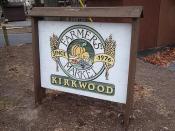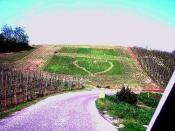"Shy as a leveret, swift as he/Straight and slight as a young larch tree/Sweet as the first wild violets, she/To her wild self. But what to me?" (lines 30-33). "The Farmer's Bride" by Charlotte Mew offers so many vivid images of nature that it is difficult to believe the speaker is a farmer. Mew presents the argument of the poem straightforwardly: The farmer's bride feels an aversion to her marriage and uses nature as her only peace, consolation, and love, which her husband will not understand. She devotes all of her love to nature and none to her husband. Hearing this story from the farmer's point of view provides detailed descriptions merged with the confused beliefs of the husband; the husband cannot understand what the reader can understand. Also, the imagery provided by the husband directly explains how the wife feels, despite the confusion of the husband. The poem, being almost completely consumed by imagery, Finally, there is a small hint of irony throughout most of the poem based on the almost effortlessly comprehensible yet confused descriptions of the farmer; the final stanzas communicate the exact intentions of the farmer, clearing up any earlier irony.
"Three summers since I chose a maid/Too young maybe--but more's to do/At harvest-time than bide and woo" (lines 1-4). The poem begins by immediately showing what the farmer thinks thus far of his marriage. He chooses his wife but states that he needs to work instead of donating time to his new wife. The outcome of this situation follows briefly: "One night, in the Fall, she runned away" (line 9). Almost as if a break from conformity, the farmer's wife runs away from her husband one night. "Should properly have been abed" (line 11). The farmer describes his attempt to impose civility upon...


